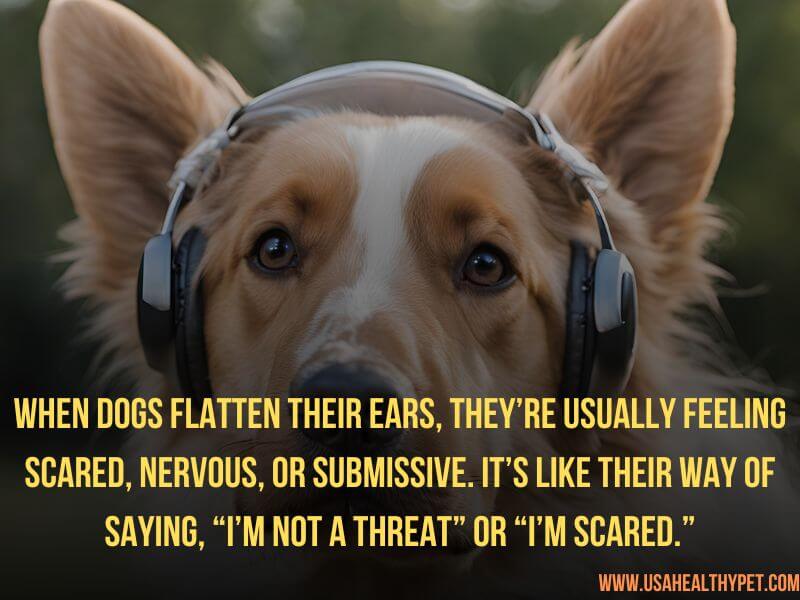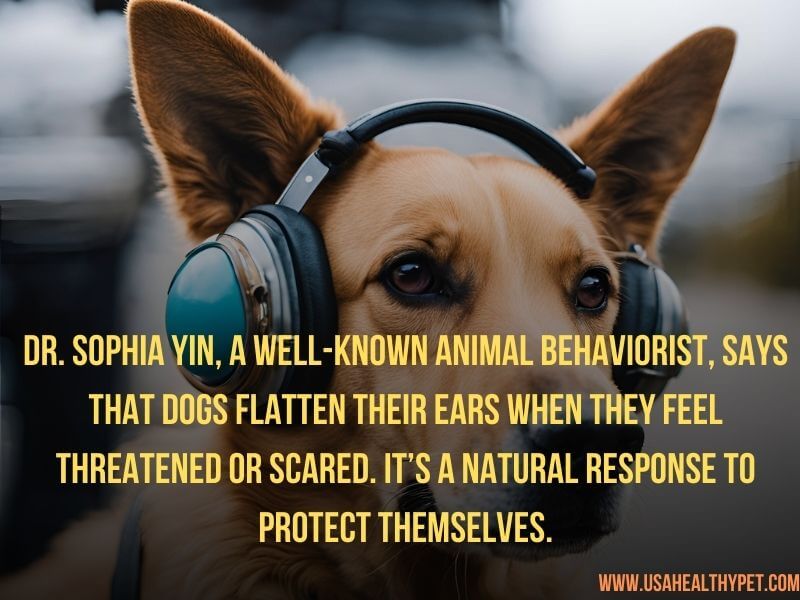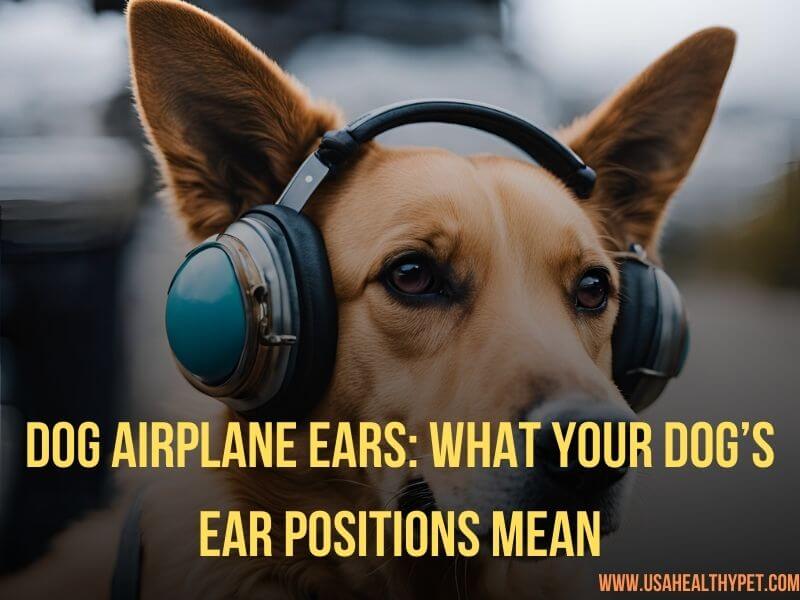Dogs do a lot of funny and interesting things, and one of those things is “airplane ears.” Have you ever seen your dog’s ears go flat and stick out to the sides like airplane wings? It can look pretty silly, but there’s a reason behind it.
Let’s dive into why dogs show airplane ears and what it means.
What Does Airplane Ears Mean?
Airplane ears are when a dog’s ears are flattened out to the sides of their head, looking like the wings of an airplane. This position often means the dog is feeling unsure, scared, or submissive.
It’s a way for them to protect their ears from potential harm and to show others that they’re not a threat.
Why Is This Important?
Knowing why dogs do this can help us understand what they’re feeling. Dogs use their ears to show their emotions.
By understanding airplane ears, we can better take care of our furry friends and make sure they’re happy and comfortable.
The Science Behind Airplane Ears
How Dogs Use Their Ears to Communicate
Dogs can move their ears in many different ways, and each position means something different.
When dogs flatten their ears, they’re usually feeling scared, nervous, or submissive. It’s like their way of saying, “I’m not a threat” or “I’m scared.”

Why Do Dogs Flatten Their Ears When They See You?
Dogs flatten their ears when they see you for various reasons. It could be a sign of submission, showing you that they respect you as the pack’s leader.
Alternatively, it might be because they are feeling a bit unsure and are seeking comfort and reassurance from you.
If your dog has done something they think might upset you, like chewing on a shoe, they might flatten their ears to show they are sorry and don’t want to be in trouble.
The Role of Breed and Anatomy
Different dog breeds have different types of ears. Some have floppy ears, like Beagles, and some have pointy ears, like German Shepherds. The shape and size of a dog’s ears can change how and why they move them.
What Experts Say
Dr. Sophia Yin, a well-known animal behaviorist, says that dogs flatten their ears when they feel threatened or scared. It’s a natural response to protect themselves.
What Does It Mean When a Dog Moves Their Ears?
When a dog moves their ears, it can tell you much about their feelings. Dogs use their ears to pick up sounds, but they also use them to communicate. Here are some common ear positions and what they mean:
- Ears Forward: When a dog’s ears are perked up and facing forward, they’re usually alert and interested in something. They might be focusing on a sound or sight.
- Ears Back: If your dog’s ears are pulled back, they might be feeling nervous, scared, or submissive. This is often seen when they’re meeting new people or in a new environment.
- Ears Relaxed: When a dog’s ears are naturally positioned, it usually means they’re relaxed and comfortable. This is a good sign that they feel safe.

Dog Ear Position Meaning and Chart
To make it easier to understand what your dog is feeling, here’s a simple chart showing different ear positions and their meanings:
| Ear Position | Meaning |
|---|---|
| Ears Forward | Alert, Interested |
| Ears Back | Nervous, Scared, Submissive |
| Ears Relaxed | Comfortable, Happy |
| Ears Flattened | Scared, Submissive, Seeking Reassurance |
| One Ear Up, One Down | Uncertain, Curious |
How to Understand Your Dog’s Airplane Ears
Look at the Situation
When you see your dog’s airplane ears, check what’s happening around them. Are they in a new place? Is there a loud noise? Understanding the situation can help you figure out why your dog is feeling scared.
Check Their Whole Body
Don’t just look at the ears. Look at your dog’s whole body. Are they cowering? Is their tail tucked? These signs together can tell you a lot about how your dog is feeling.
Comfort Your Dog
If your dog is scared, try to comfort them. Speak softly, pet them gently, and give them a safe place to relax. This can help them feel better.
Ask a Professional
If your dog is often scared or anxious, it might be good to talk to a veterinarian or a dog trainer. They can give you advice on how to help your dog feel more comfortable.
Comparing Different Ways to Help Your Dog
There are several ways to help your dog when they show airplane ears. Here’s a quick look at some options:
| Solution | Pros | Cons |
|---|---|---|
| Training | Can help long-term | Takes time and patience |
| Changing the Environment | Can reduce triggers of anxiety | Not always possible |
| Professional Help | Expert advice | Can be expensive |
| Comforting Your Dog | Provides immediate relief | Might not solve the problem long-term |
Extra Tips for Helping Your Dog
Keep Things Consistent
Dogs like routines. Try to keep things the same day-to-day so your dog knows what to expect. This can help reduce anxiety.
Reward Good Behavior
When your dog is calm and relaxed, give them treats and praise. This helps them learn that being calm is a good thing.
Regular Vet Visits
Sometimes, airplane ears can be a sign of a health issue. Regular vet check-ups can help catch any problems early.
Conclusion
Understanding why dogs show airplane ears can help us be better pet owners. It’s all about paying attention to their body language and making sure they feel safe and happy.
By noticing these signs and reacting appropriately, we can ensure our dogs live stress-free lives.
FAQs
1. Why does my dog flatten their ears when meeting new people?
Your dog might be feeling nervous or scared around new people. It’s their way of saying they’re not sure about the situation.
2. Can airplane ears mean my dog is in pain?
While it usually means fear or anxiety, if your dog does this a lot, it’s good to check with a vet to make sure they’re not in pain.
3. How can I make my dog feel less anxious?
Comfort them with a calm voice, petting, and a safe space. Training and professional help can also make a big difference.
4. Do all dogs show airplane ears the same way?
No, it can look different depending on the breed. Dogs with floppy ears and dogs with pointy ears might show this behavior differently.
5. Should I be worried if my dog often shows airplane ears?
If it happens a lot, it’s a good idea to talk to your vet or a dog trainer. They can help figure out if your dog is anxious and what to do about it.

Pingback: Exploring Dog Breeds with Widow’s Peak: The Charm of This Unique Feature - Top Health Tips for Dog and Cat Care and Wellness
Pingback: What is a Skinwalker Dog? How to Identify and Respond